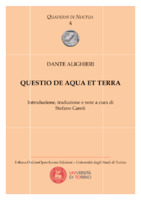Sfoglia documenti (228 in totale)
Regionalismo differenziato e specialità regionale: problemi e prospettive Atti del IV Convegno annuale della rivista "Diritti regionali. Rivista di diritto delle autonomie territoriali"
Regime e dissenso. 1931. I professori che rifiutarono il giuramento fascista
Razionalizzazione del pluralismo giuridico e Panchayati Raj in India
Rappresentazioni del limite. Passaggi del fantastico tra letteratura e cinema.
(Atti del Convegno Internazionale, Torino 19-20 novembre 2015)
Questio de aqua et terra
This volume offers a new edition of the original text and an Italian translation of Dante Alighieri’s Questio de aqua et terra, discussed in Verona in 1320. The introductory apparatus and the textual commentary reconstruct the historical context of the quaestio (in the light of the debates on the nature of the elements and Aristotelian cosmology), its discussions in the historiography of science and philosophy, and the fortune of the text in its editions from the sixteenth century onwards.
QUALI-DAD. Una ricerca qualitativa sui significati e le pratiche degli accademici italiani riguardo la didattica a distanza durante l'emergenza Covid-19
QUALI-DAD: A qualitative study of Italian academics’ distance teaching practices during the Covid-19 emergency and the meanings assigned to them
This report illustrates the findings of a qualitative study that explored Italian academics’ relationship with distance teaching during the Covid-19 pandemic emergency. Specifically, 18 focus groups with 4 to 8 participants each were held at several universities throughout the country, for a total of 98 participants. Two focus groups were held at each university, one with faculty members in the humanities, and one with faculty members in scientific disciplines. Participants were heterogeneous in terms of gender and career stage, and were selected at random from the CINECA lists. The focus groups took place online, and were video/audio recorded. The material thus collected was analyzed via a grounded and iterative coding process involving repeated rounds of data analysis and discussion among the researchers.
The analysis led to a number of interesting insights, which have been grouped under four main headings.
- A controversial question;
- Teaching in crisis;
- The rediscovery of teaching;
- Hopes and fears for the future.










